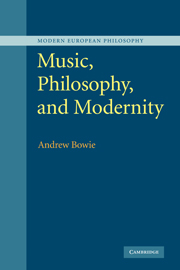Book contents
- Frontmatter
- Contents
- Preface
- Introduction
- 1 Form, feeling, metaphysics, and music
- 2 Music, language, and the origins of modernity
- 3 Rhythm and Romanticism
- 4 Hegel, philosophy and music
- 5 Music and the subjects of Romanticism
- 6 Music, freedom, and the critique of metaphysics
- 7 Pro and contra Wagner
- 8 Music, language, and being: Wittgenstein and Heidegger
- 9 Adorno: musical philosophy or philosophical music?
- Conclusion
- References
- Index
8 - Music, language, and being: Wittgenstein and Heidegger
Published online by Cambridge University Press: 15 October 2009
- Frontmatter
- Contents
- Preface
- Introduction
- 1 Form, feeling, metaphysics, and music
- 2 Music, language, and the origins of modernity
- 3 Rhythm and Romanticism
- 4 Hegel, philosophy and music
- 5 Music and the subjects of Romanticism
- 6 Music, freedom, and the critique of metaphysics
- 7 Pro and contra Wagner
- 8 Music, language, and being: Wittgenstein and Heidegger
- 9 Adorno: musical philosophy or philosophical music?
- Conclusion
- References
- Index
Summary
Explicit and implicit music
The fact that it took until the work of Karl-Otto Apel in the 1970s (Apel 1973, 1976) for the affinities between Wittgenstein and Heidegger to be widely appreciated is a symptom of the divisions between ‘analytical’ and ‘European’ approaches in twentieth-century Western philosophy.These divisions appear in Kivy's claim, cited in the Introduction, that ‘Music, of all the arts, is the most philosophically unexplored and most philosophically misunderstood where it has been explored at all’ (Kivy 1997: 139). This is obviously not the case for the European tradition, and therefore could be valid only for the analytical tradition. But then consider the following. Wittgenstein must be regarded as part of the analytical tradition. However, even in his early writings, which helped to establish the terms of analytical philosophy, he used music as a means of asking questions about philosophy. On the other hand, Heidegger, for many the epitome of a ‘European’ philosopher, wrote virtually nothing about music, although he did think that it was important. Despite Heidegger's lack of attention to music, we have already seen that music plays a role in his work. I want in this chapter to explore this role a bit further, but I mainly want to argue at greater length that, along with the explicit role which music plays in Wittgenstein's thinking, it plays an important implicit role which has rarely figured in the main interpretations of his philosophy. My claim will be that the entanglement of music and philosophy is not primarily a philosophical problem for Wittgenstein, but is instead a resource for exploring the nature of language and the world.
- Type
- Chapter
- Information
- Music, Philosophy, and Modernity , pp. 261 - 308Publisher: Cambridge University PressPrint publication year: 2007
- 1
- Cited by



